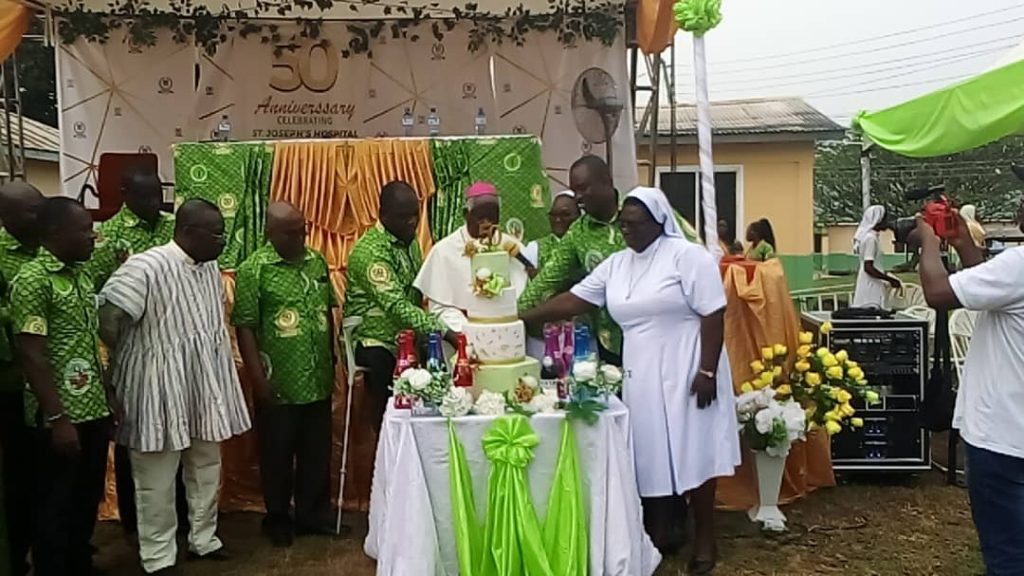By Patience Tawiah
Nkwanta (O/R), Oct. 26, GNA- Dr Koku Awoonor Williams, Director of Policy, Planning, Monitoring and Evaluation of the Ghana Health Service has called for the need to tackle the challenges that COVID-19 has come.
He said the pandemic had created some shocks and had also brought about public health interventions, creative and clinical interventions as well as the use of traditional strategy in the country’s health system making it poised to be ready and responsive to emerging threats, stress and burnouts, health infrastructure, community education, sensitisation and surveillance.
Dr Awoonor-Williams, a former Director of Health of Nkwanta South made these remarks to climax the Golden Jubilee celebration of St Joseph’s hospital at Nkwanta, which was themed, “50 years of Catholic Healthcare Delivery, Honouring the Past, Celebrating the Present, Envisioning the Future.”
He said there was the need to reposition the primary healthcare system to deal with some of the challenges since it implied efforts in achieving universal health coverage (UHC).
He said the changing disease pattern from communicable to non-communicable and injury meant that the healthcare burden must be dealt with, adding that the transition in diseases was closely linked to the demographic shift.
“We need to improve the quality and comprehensiveness of care we are providing to our people, identify and provide essential health service package at all times of care that will address citizens a priority, disease concerns and also ensure equitable access to healthcare and health improvement service at the point of service delivery.”
Dr Awoonor-Williams said the immense contribution and sacrifices of management and staff had seen the St Joseph’s Hospital to its present state looking at the challenges including the lack of social amenities that affected it at inception.
He said despite the difficulty and depravity of communities, terrible roads-muddy and dusty, the impossible terrain across the length and breadth of the district, and lack of electricity and potable water, healthcare service had to be delivered.
He said the transformation of the St. Joseph Clinic to its current state, a full-fledged four-star hospital, culminating in a golden jubilee was justifiable and worth celebrating.
He said the country’s health sector over the years had seen some of the major and significant transformations as well as a major improvement in many of the country’s health indicators such as maternal infant and child mortality over the past five decades.
Dr Awoonor-Williams said there was also improvement in many of the diseases including guinea worm, measles, malaria as well as traditional beliefs and cultural practices that were afflicting and sometimes killing people most especially women and children.
“Today, the improvement we see especially in many of these conditions including the communicable diseases were due to the many of the public health interventions carried out by these institutions like St Joseph including the health promotion, community health education, immunisation programmes and outreaches such as timely treatment of minor of ailments in various communities.”

He said despite the great achievements, Ghana’s disease burden had become more complex adding that, “we now have a triple burden disease with communicable diseases, non-communicable diseases and accidents and injuries and all these poses major havoc to our population.”
Dr Awoonor-Williams said malaria, lower respiratory infection, neonatal disorders, heart disease, stroke, HIV/AIDS, tuberculosis, diarrhea diseases, road traffic accident, diabetes, hypertension, mental disorders, and conditions affecting the elderly were killing Ghanaians in terms of ranking.
Most Reverend Gabriel Akwesi Ababio Mantey, the Bishop of Catholic Diocese of Jasikan urged the health workers to remember that it took the effort of some hard and committed staff to bring this hospital to this level therefore they should think about the future of the hospital and the lives of their patients.
He said the achievements of the facility stemmed from correcting its failures to chalk the current successes including its infrastructure considering planning for the future.
He entreated all and sundry to avoid enslavement to its past, forge a stronger future and specialise, as a norm in the 21st Century.
The month-long activities include football games with some institution in the Oti region, health education to public schools, radio programmes, clean up exercises, health screening activities especially breast cancer.
GNA